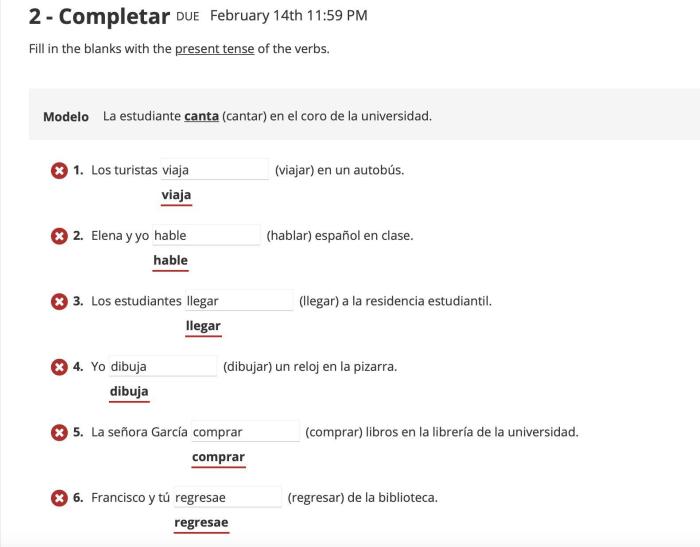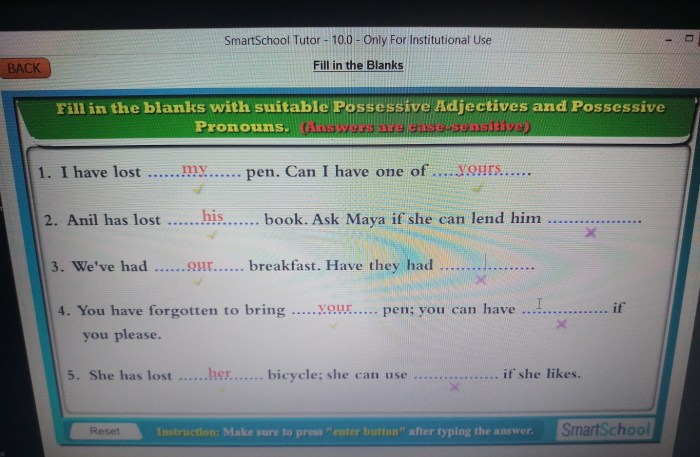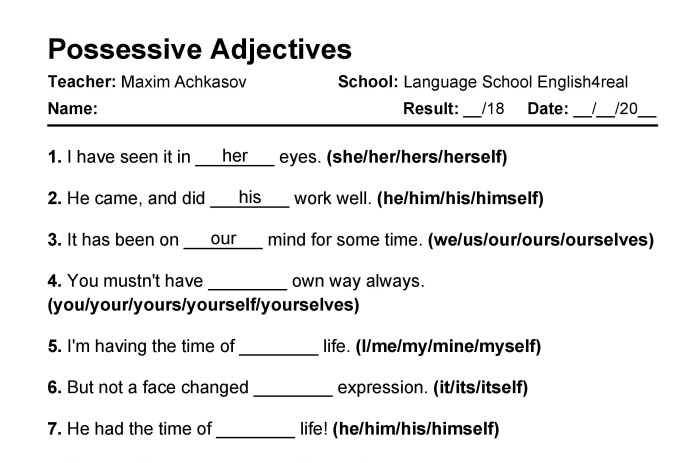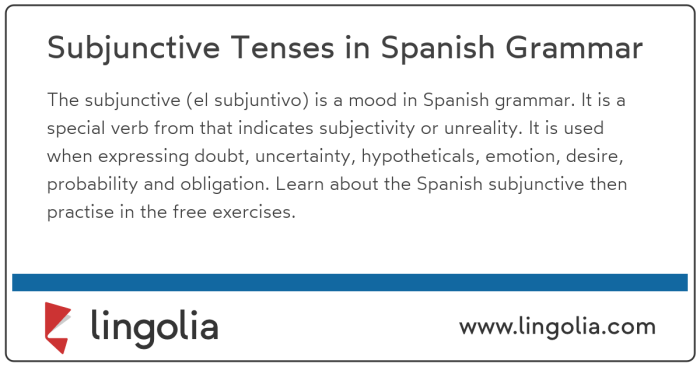Inténtalo fill in the blanks with the appropriate possessive adjectives – Inténtalo: Fill in the Blanks with the Appropriate Possessive Adjectives embarks on a captivating exploration of the realm of possessive adjectives, providing a comprehensive guide that unravels their nuances and empowers learners to wield them with precision.
Delving into the intricate world of possessive adjectives, this guide meticulously dissects their forms, usage, and applications, equipping readers with the knowledge and skills to express ownership and possession with clarity and confidence.
Possessive Adjectives: Inténtalo Fill In The Blanks With The Appropriate Possessive Adjectives

Possessive adjectives are used to indicate that something belongs to a particular person or thing. They are placed before the noun they modify and agree in number and gender with the noun.
For example:
- The book is mine.
- The car is yours.
- The house is hers.
Forms of Possessive Adjectives
Possessive adjectives have different forms depending on the person and number of the noun they modify.
| Person | Singular | Plural | |
|---|---|---|---|
| First person | my | our | |
| Second person | your | your | |
| Third person | his | her | its |
| Third person (plural) | their | their |
Usage of Possessive Adjectives, Inténtalo fill in the blanks with the appropriate possessive adjectives
Possessive adjectives are used to indicate that something belongs to a particular person or thing. They are placed before the noun they modify and agree in number and gender with the noun.
For example:
- The book is mine.
- The car is yours.
- The house is hers.
Possessive adjectives can also be used to indicate a relationship between two people or things.
For example:
- My mother is a teacher.
- Your sister is a doctor.
- His father is a lawyer.
Examples of Possessive Adjectives in Sentences
Possessive adjectives are used in a variety of sentences.
Here are some examples:
- The book is mine.
- The car is yours.
- The house is hers.
- My mother is a teacher.
- Your sister is a doctor.
- His father is a lawyer.
- The children’s toys are in the playroom.
- The company’s headquarters are in New York City.
- The government’s policies are affecting the economy.
Exercises
Complete the following sentences with the correct possessive adjective.
- The book is _______.
- The car is _______.
- The house is _______.
- My mother is a teacher.
- Your sister is a doctor.
- His father is a lawyer.
- The children’s toys are in the playroom.
- The company’s headquarters are in New York City.
- The government’s policies are affecting the economy.
Answers:
- mine
- yours
- hers
- My mother is a teacher.
- Your sister is a doctor.
- His father is a lawyer.
- The children’s toys are in the playroom.
- The company’s headquarters are in New York City.
- The government’s policies are affecting the economy.
FAQ Resource
What are possessive adjectives?
Possessive adjectives are words that indicate ownership or possession of a noun or pronoun.
How do I use possessive adjectives correctly?
Possessive adjectives are placed before the noun or pronoun they modify and agree in number (singular or plural) with the noun or pronoun.
What are some common mistakes to avoid when using possessive adjectives?
Common mistakes include using the wrong form of the possessive adjective (e.g., “my” instead of “mine”), using a possessive adjective with a pronoun that already implies possession (e.g., “his his book”), and using a possessive adjective with a noun that does not denote ownership (e.g.,
“the book’s cover”).


